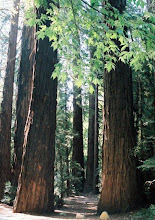She is right in the sense that much of Lutheran theology finds us trying to hold two truths in tension: we are saints, completely forgiven and washed clean; and we are also sinners, still imperfect and falling short all throughout our lives. Saint and Sinner. Now and not yet.
Advent and Christmas are full of this now/not yet tension; we celebrate the birth of Jesus who has already come and we wait for Jesus the Christ to come again. Jesus is born human, a tiny newborn like any new baby and Mary labors and gives birth like any mother and yet this Jesus is also God, completely divine, and comes to Mary unlike any birth before or since.
The deeper my faith gets, the more I realize that it is filled with the tension of these paradoxes; the now/not yets, the yes to seeming contradictions. It is not that God's gift of faith is imperfect but rather that I cannot grasp the entirety of the mystery. Sometimes I think that the deeper my faith grows, the less I know or perhaps it is that I am able to let go of needing to feel like I have the answers.
I think that the very beginning of a child's faith and the deep faith of a lifetime of faithfulness bring us to the same place: God loves us and sent Jesus, the Savior to save us. We are loved and forgiven. The gift has been given. I cannot pretend to understand how God has accomplished this, or the whys; all I can do is rest in faith and trust. Sometimes I think we can spend a whole life-time of faithful searching, study, and prayer just to work ourselves back to the sure faith of a child: "Jesus loves me, this I know". (Of course, Jesus said something about this, read Mark 10:15. "Truly I tell you, whoever does not receive the kingdom of God as a little child will never enter it.")
My experiences as a mother have perhaps helped me live a little easier with all the paradoxes of now/not yet. For me, pregnancy was living out an ultimate paradox complicated by several miscarriages. The early months it can be very hard to really feel and changes, unless "morning sickness" is part of the experience.
But then as the pregnancy progresses, the existence of the baby becomes more and more real. The urge to share that with my husband meant that he had to learn patience as he put his hand on my belly, waiting to feel the baby kick. Later on, I've had such experiences as people watching me as the baby had hiccups and you could see my belly bob up and down or watch a foot or elbow move from side to side. Then finally with birth, the child is here.
The time of now/not yet can be very precarious and so our waiting is filled with fears and impatience as well as joy.
The same is true of faith. We wait eagerly and we wait with hope, but the time of waiting also leaves us time to doubt, to ask questions, and to make mistakes. That is why God's grace is the only thing that makes faith last. By ourselves, the paradoxes, the questions, and the waiting would wear our faith away but God gives us the gift of faith and stays with us through it all, loving and caring for us.
With the birth of Jesus, God-with-us, we declare to the world that the promise has been fulfilled. Salvation has come! Alleluia! Read Romans 8:19-15.
My experiences as a mother have perhaps helped me live a little easier with all the paradoxes of now/not yet. For me, pregnancy was living out an ultimate paradox complicated by several miscarriages. The early months it can be very hard to really feel and changes, unless "morning sickness" is part of the experience.
But then as the pregnancy progresses, the existence of the baby becomes more and more real. The urge to share that with my husband meant that he had to learn patience as he put his hand on my belly, waiting to feel the baby kick. Later on, I've had such experiences as people watching me as the baby had hiccups and you could see my belly bob up and down or watch a foot or elbow move from side to side. Then finally with birth, the child is here.
The time of now/not yet can be very precarious and so our waiting is filled with fears and impatience as well as joy.
The same is true of faith. We wait eagerly and we wait with hope, but the time of waiting also leaves us time to doubt, to ask questions, and to make mistakes. That is why God's grace is the only thing that makes faith last. By ourselves, the paradoxes, the questions, and the waiting would wear our faith away but God gives us the gift of faith and stays with us through it all, loving and caring for us.
With the birth of Jesus, God-with-us, we declare to the world that the promise has been fulfilled. Salvation has come! Alleluia! Read Romans 8:19-15.





















